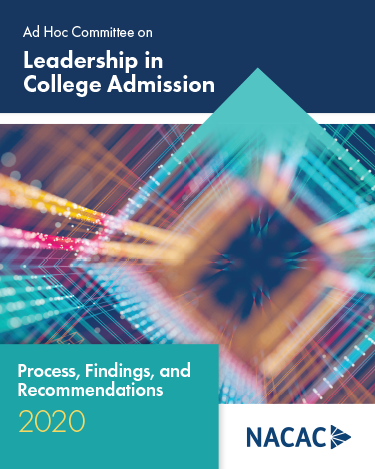Ad Hoc Committee on Leadership in College Admission:
Process, Findings, and Recommendations
 In September 2020, NACAC released Ad Hoc Committee on Leadership in College Admission: Process, Findings, and Recommendations, a much-anticipated blueprint for transforming the association and empowering it to help shape a postsecondary landscape that is accessible, inclusive, equitable, and affordable for all.
In September 2020, NACAC released Ad Hoc Committee on Leadership in College Admission: Process, Findings, and Recommendations, a much-anticipated blueprint for transforming the association and empowering it to help shape a postsecondary landscape that is accessible, inclusive, equitable, and affordable for all.
Written by a team of members from a variety of backgrounds and settings, the report examines today’s NACAC as well as US higher education overall and makes bold recommendations for change. The effort was chaired by Angel B. Pérez before his appointment as NACAC CEO.
The Ad Hoc Committee, whose formation was announced by NACAC President Jayne Fonash at the 2019 National Conference in Louisville, tackled questions that have concerned member institutions and organizations for years and posed challenges to our work and the students we serve. The committee had made significant progress by early 2020, when the COVID-19 pandemic disrupted the admission profession and the entire world, and then news of violent acts of racism sparked social unrest across the United States and made the committee’s mission more crucial than ever.
The final report explores five themes – mission vision and clarity; transparency; diversity, equity, and inclusion; knowledge source; and technology – that, in the committee’s words, “will demand extraordinary time, talent, and resources from NACAC.” In addition, the document examines the association’s record of service to the college admission profession, NACAC’s values, and the condition of US higher education today before offering seven provocative recommendations.
In brief, they challenge NACAC to:
- Revise mission and vision statements to ensure relevancy;
- Execute a campaign to communicate the new mission and vision statements;
- Invest in initiatives that provide greater support to all students and families;
- Conduct a product and services audit to ensure that core offerings align with the revised mission and vision;
- Conduct a technology audit, exploring new resources and partnerships for investment
- Make special recommendations for NACAC’s code of ethics; and
- Establish a standing practice to review governance systems every 5-7 years.
“(W)e see this moment not as one to shrink from, but rather one to embrace,” declares the committee. “NACAC has an opportunity right now to leverage the talent and resources within our organization to become the authoritative voice with policy makers and the media; to create greater avenues to education; and to collaborate with other organizations to affect positive change.”
Links
» NACAC Leadership Report
» Committee Members
» ROADMAP FOR CHANGE: Reimagining US Higher Education as a Public Good
Videos
Several committee members provided these personal reflections on the importance of their work and findings.
Tevera Stith, KIPP DC
Katy Murphy, Ballarmine College Preparatory (CA)
Janet Marling – National Institute for the Study of Transfer Students (GA)
Ffiona Rees, University of California – Los Angeles
Rick Clark, Georgia Institute of Technology
Ken Anselment, Lawrence University (WI)
Cassie Magesis, The Urban Assembly (NY)
Committee Members
Angel Perez, Chair
Trinity College (CT)
Ken Anselment
Lawrence University (WI)
Jon Boeckenstedt
Oregon State University
Rick Clark
Georgia Institute of Technology
Rafael Figueroa
Albuquerque Academy (NM)
Marquita Guzman
Portland Public Schools (OR)
Amy Jarich
University of California – Berkeley
Cassie Magesis
The Urban Assembly (NY)
Janet Marling
National Institute for the Study of Transfer Students (GA)
Katy Murphy
Ballarmine College Preparatory (CA)
Ffiona Rees
University of California – Los Angeles
Tevera Smith
KIPP DC
Mitchell Thompson
Scarsdale High School (NY)
Kimberly Urenda
Shawnee Mission West High School (KS)